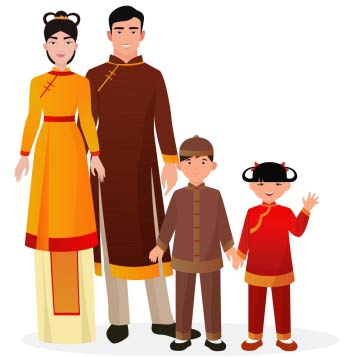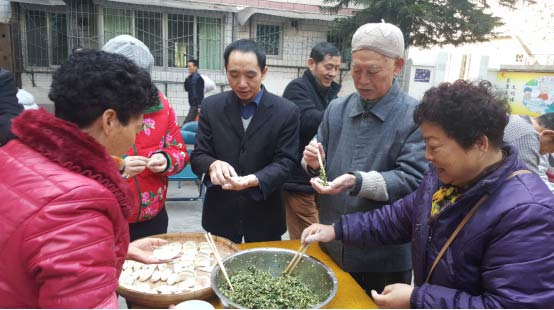Chinese Family Concept
The concept of Chinese family, which has lasted for more than 3,000 years, is unique in the world and is very different from the values of Western countries. The Chinese family concept is an important part of Chinese culture and an indispensable part of understanding Chinese culture. It is included in the traditional Chinese values and together constitutes a unique face of Chinese culture.
Understanding Chinese family values and the role of families in China can help international students who study in China better understand Chinese culture and maintain a better relationship with Chinese students and their families. Let's take a closer look at the connotation of Chinese families.

1. The structure of Chinese families
The foundation of China's social structure is the family, and the foundation of the Western social structure is the individual. This determines that the traditional Chinese are family-oriented and the family is more important than the individual. Chinese people pay attention to family life and build a harmonious society by forming families. In a harmonious family in China, when family members encounter things that don't go well, they tend to go home and communicate with their families. Through the comfort of their families, they can resolve their troubles, which has a positive effect on maintaining Chinese family harmony and social stability and unity.

2. The values of Chinese families
In traditional Chinese culture, families constitutes a country. This forms China's collective value orientation. Especially under the influence of Confucianism, the Chinese advocate that all interests of the state, society and family should be taken seriously, and personal interests should be subject to collective interests. When necessary, you can sacrifice personal interests in exchange for collective interests. However, in Western capitalist society, individualistic values have penetrated into all aspects of some countries.

3. The relationship between Chinese families and individuals
In China, family culture is contemporary. The family is influenced by the times and each family has a strong brand of the times. The families of Chinese feudal society have a strong feudalism. In the feudal patriarchal system, the family controls everything. In the family, the status of men and women is equal and respect each other's values.
Chinese people are influenced by Confucianism, paying more attention to blood relationship and family concept. They like to live in groups. With the continuous development of the economy and society, most Chinese still retain this habit, especially reflected in traditional Chinese festivals, such as New Year's Eve. In specific festivals, Chinese strengthen communication and deepen the feelings between each other. In the relationship between the individual and the family, the family is always the first and the personal interests are subject to the family interests. Compared with the Chinese, Westerners pay less attention to blood relations and clan relations. In Western culture, personal interests are often more important than family interests.

4. The relationship between Chinese family members
In the traditional culture of China, there are thoughts in Chinese that "he was in the marketplace, and she was in the home". Men dominate the family, while women and children are dominant. Chinese children rely on their parents since childhood. They accept the education and lessons of their parents, and obey the arrangements of their parents. Being an adult, you must be filial to your parents and assume the responsibility of the family. Every family member, regardless of gender, is entitled to the rights and status of the owner.

5. The relationship between Chinese families and families
It is always a fine tradition of our country that neighbors should help each other. In modern Chinese society, people's living environment has changed, and contact between neighbors has been less than in the past. However, the neighbourhood still maintains a fine tradition of mutual understanding and harmonious coexistence. Most families take the initiative to assume public responsibility and create a warm and friendly neighborhood. In the West, families pay more attention to privacy and space.
Visiting relatives and friends between clan in China is a very normal kind of interpersonal relationship, even without an appointment.

6. Family education in China
The general concept in China is that family education is the most basic education in the three major educations of family education, school education and social education. Parents are children's first teacher, and family education will have a huge impact on the child's life. When it comes to family education in China, it can be said that every Chinese has a personal experience. As an ancient civilization with a long history and tradition, China's family culture has its own traditions and characteristics. It has both excellent traditions and backward feudal ideas.
The care of Chinese families for their children can be equal to spoiling, especially the majority of modern Chinese families have only one child. In addition to parental care, there are also grandparents' care. Even if things like bowling and mopping, parents won't let their children do it. Children grew up in the care and protection of adults, and they developed the habit of relying on their elders for everything. In Western family education, more emphasis is placed on cultivating individual independence and self-confidence.
In Chinese families, parents teach children to listen to their elders and teachers. When the elders speak, children can't talk freely. When parents are talking about something, they have told the child in advance whether it is right or wrong. Therefore, the child can only passively obey the arrangements of parents and elders. The concept of hierarchy infiltrates into the hearts of children from an early age. In Western families, most of the children are more active, and they can express their own opinions in front of their parents.
Families in China are overprotective to their children, causing their children to be highly dependent on their parents, making them suspect or lose their correct assessment of their self-worth and ability. Their problems are solved by their parents. Parents are afraid that their children will be injured and deceived. Many things or activities parents think dangerous will prevent children from getting in touch. The education of Chinese family means passive acceptance of children. Simply telling the child what can and can't do will only constrain the child's ability to explore and seek knowledge. However, as more and more Chinese families become aware of this deficiency, many parents are correcting these mistakes. They let their children take risks and explore the unknown, which is good for the development of children and the improvement of Chinese family education.




